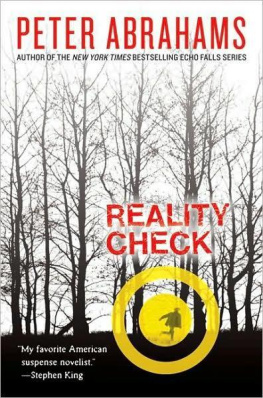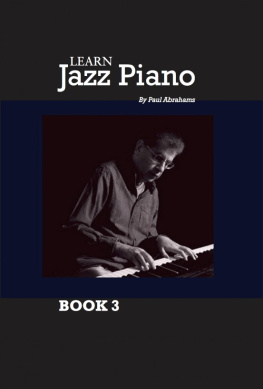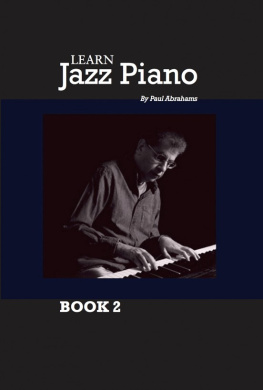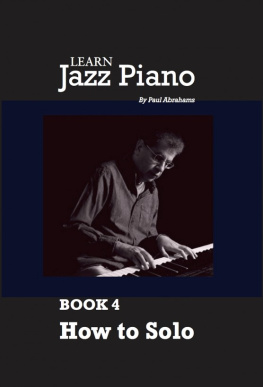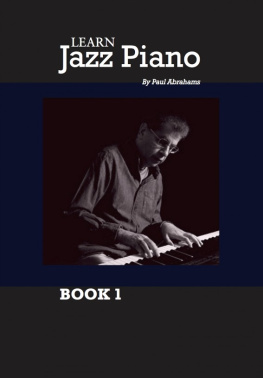Peter Abrahams - A Perfect Crime
Here you can read online Peter Abrahams - A Perfect Crime full text of the book (entire story) in english for free. Download pdf and epub, get meaning, cover and reviews about this ebook. genre: Detective and thriller. Description of the work, (preface) as well as reviews are available. Best literature library LitArk.com created for fans of good reading and offers a wide selection of genres:
Romance novel
Science fiction
Adventure
Detective
Science
History
Home and family
Prose
Art
Politics
Computer
Non-fiction
Religion
Business
Children
Humor
Choose a favorite category and find really read worthwhile books. Enjoy immersion in the world of imagination, feel the emotions of the characters or learn something new for yourself, make an fascinating discovery.

- Book:A Perfect Crime
- Author:
- Genre:
- Rating:5 / 5
- Favourites:Add to favourites
- Your mark:
- 100
- 1
- 2
- 3
- 4
- 5
A Perfect Crime: summary, description and annotation
We offer to read an annotation, description, summary or preface (depends on what the author of the book "A Perfect Crime" wrote himself). If you haven't found the necessary information about the book — write in the comments, we will try to find it.
A Perfect Crime — read online for free the complete book (whole text) full work
Below is the text of the book, divided by pages. System saving the place of the last page read, allows you to conveniently read the book "A Perfect Crime" online for free, without having to search again every time where you left off. Put a bookmark, and you can go to the page where you finished reading at any time.
Font size:
Interval:
Bookmark:
Peter Abrahams
A Perfect Crime
The scarlet letter was her passport into regions where other women dared not tread.
Nathaniel Hawthorne1
Thursday, the best day of the week-the day of all days that Francie was predisposed to say yes. But here in the artists studio, with its view of the Dorchester gas tank superimposed on the harbor beyond, she couldnt bring herself to do it. The problem was she hated the paintings. The medium was ink, the tool airbrush, the style photorealist, the subject slack-faced people in art galleries viewing installations; the installations, when she looked more closely, were neon messages fenced in with blood-tipped barbed wire, messages that though tiny could be read, when she looked more closely still. Francie, her nose almost touching the canvases, read them dutifully: name that tune; do you swear to tell the truth?; we will have these moments to remember.
World within world, she said, a neutral phrase that might be taken optimistically.
Im sorry? said the artist, following her nervously around the studio.
Francie smiled at him-gaunt, hollow-eyed, twitchy, unkempt-Raskolnikov on amphetamines. Shed seen paintings of slack-faced people looking at paintings; shed seen neon messages; shed seen barbed wire, blood-tipped, pink, red-white-and-blue; seen art feeding on itself with an appetite that grew sharper every day.
Anything else youd like to show me? she said.
Anything else? said the artist. Im not sure exactly what you..
Francie kept her smile in place; artists lived uneasy lives. Other work, she explained, as gently as she could.
But not gently enough. He flung out his arm in a dramatic sweep. This is my work.
Francie nodded. Some of her colleagues would now say I love it and let him learn the bad news in a letter from the foundation, but Francie couldnt. Silence followed, long and uncomfortable. Time slowed down, much too soon. On Thursdays, Francie wanted time to behave as it might in some Einsteinian thought experiment, hurrying by until dark, then almost coming to a stop. The artist gazed at his shoes, red canvas basketball sneakers, paint-spattered. Francie gazed at them, too. Do you swear to tell the truth? Even bad art could get to you, or at least to her. She saw something from the corner of her eye-a small unframed canvas, leaning against the jamb of a doorless closet, went closer, to end the shoe-gazing if nothing else.
Whats this? An oil painting of a plinth, cracked, crumbling, classical, bearing a bunch of grapes, wine-dark, overripe, even rotting. And in the middle ground, not hidden, not flaunted, simply there, was a lovely figure of a girl on a skateboard, all poise, balance, speed.
That? said the painter. Thats from years ago.
Tell me about it.
Whats to tell? It was a dead end.
You didnt do any more like it? Francie knelt, turned the painting around, read the writing on the back: oh garden, my garden.
By the dozen, said the artist. But I painted over them whenever I needed canvas.
Francie kept herself from glancing at the busy pieces on the wall.
Thats the last one, in fact. Why do you ask?
It has a kind of Something. It had that something she was always looking for, so hard to put in words. To sound professional, Francie said, resonance.
It does?
In my opinion.
No one liked them at the time.
Maybe Im just a sucker for overripe fruit, Francie said, although she already knew it wasnt that. It was the girl. Caravaggio, and all that, she explained.
Caravaggio?
You know, she said, her heart sinking.
A kind of grape?
He said that? A kind of grape? Nora, having finished her lunch-a very late lunch, eaten on their feet at a coffee place in the North End-helped herself to Francies. Soon the past will be completely forgotten.
And life can begin, said Francie.
Nora paused in midbite. You feeling okay?
Why do you ask?
Hows Jolly Roger these days?
Why do you ask?
Nora laughed, choked slightly, wiped her mouth. Can you play for me tonight?
Nora meant tennis: they belonged to the same club, had played together since eighth grade. Not on Th-no, Francie said.
I hate to cancel on her.
Who?
Anne? Anita? New member. Shy little frau, but she has a nice game. You should meet her.
Not tonight.
You said that. Whats tonight?
Work, Francie said, not without a twinge inside. And you?
Got a date. He called me this morning.
For tonight? And you said yes?
He already knows Ive been married twice-do I have to simper like a virgin for the rest of my life?
Whos the lucky guy?
Bernie something.
Francie picked up the check-Noras settlement from marriage one had gone the other way the second time-and got her car from the parking garage. She turned on the radio, found Ned, drove out of the city.
And were back. Im Ned Demarco, the program is Intimately Yours, our beat marriage, love, family in this increasingly complex world. Its Thursday, and as our regular listeners know, Thursday is our free-form day, open-forum time, no studio guests, no set topics. We talk about what you out there want to talk about. Welcome to the program, Marlene from Watertown.
Dr. Demarco?
Ned, please.
Ned. Hi. I really enjoy your show.
Thank you, Marlene. Whats on your mind?
First, can I ask you something?
Shoot.
That voice of yours. Do they do anything to, like, enhance it?
Ned laughed. Lucy, in the control room: Doing anything to enhance my voice? He laughed again, easy and natural. More relaxed with every show, Francie thought. Lucy says shes doing all that science possibly can. Anything else, Marlene?
Its about my husband, I guess. The woman paused.
Go on.
He-hes a wonderful father, an excellent provider. Even helps out around the house.
Sounds ideal.
I know. Which is why I feel so guilty for saying this, even having it in my mind.
Having what in your mind, Marlene?
She took a breath, deep and troubled, audible down her phone line, over the air, through the speakers in Francies car. Lately Ive been daydreaming a lot about this boy I went with back in high school. And nightdreaming. Im talking about all the time, Dr.-Ned. And my question is, Would there be any harm in looking him up?
Ned paused. Francie could feel him thinking. She drove into a tunnel and lost him before the answer came.
The city dwindled in her rearview mirror until there was nothing left but the tops of the two big towers that gave downtown its distinctive look, intruding on a cold, silvery sky. Francie crossed the New Hampshire line, drove north on roads of less and less importance, entered the wilderness beyond the last bed-and-breakfast, and came to Brendas gate at dusk. She got out of the car, unlocked the gate, drove through, leaving the gate closed but unlocked, as she always did. The rutted track, thick with dead leaves, led up over a hill, then down through rocky meadows to the river. Most of the light had drained from the sky, but the river held on to what was left, in odd blurred streaks of red, orange, and gold: like an autumnal Turner seen through a fingerprint-smeared lens. Francie stopped in front of the little stone jetty, where two dinghies-red Prosciutto and green Melone- were fastened to the lee side. Climbing into one, she discovered the cause of the odd blurring-a skin of ice lay on the river. So soon? She rowed out to the island, oar blades slicing through the fiery glaze, sheared ice scratching against her bows.
Brendas island, two or three hundred feet across the river, almost halfway, was a fat oval with flattened ends, no bigger than an acre. It had a floating dock, five huge elms, isolated from disease, thick brush that hadnt been cleared in years, and a flagstone path leading up to the cottage. Francie unlocked the door and went inside, closing the door and leaving it unlocked, as she always did.
Font size:
Interval:
Bookmark:
Similar books «A Perfect Crime»
Look at similar books to A Perfect Crime. We have selected literature similar in name and meaning in the hope of providing readers with more options to find new, interesting, not yet read works.
Discussion, reviews of the book A Perfect Crime and just readers' own opinions. Leave your comments, write what you think about the work, its meaning or the main characters. Specify what exactly you liked and what you didn't like, and why you think so.

